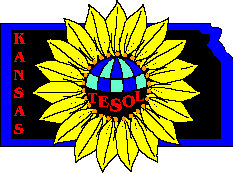
December 2003
EFL/ESL Distinction Argued on JALTTALK
It's Bread OR Butter for Part-timers
Report from Rocky Mountain TESOL 2003
Preview of KATESOL 2004
![]()
/ Index /
/ Letters /
/ Search /
![]()
Subscribe
for free!
New Age Meets Cultural Diversity in Denver
Report from Rocky Mountain TESOL 2003
Whether your Colorado memories are sparked by John Denver's
"Rocky Mountain High" or Joe Walsh's "Rocky Mountain Way,"
Colorado TESOL's 27th Annual Fall Convention and Exhibition
at the Radisson Southeast Denver Hotel and Convention Center
would have really taken you back. This meeting also brought
together Arizona TESOL, New Mexico TESOL, Intermountain TESOL
and was the 19th Rocky Mountain Regional TESOL gathering. More
than 700 people attended the two-day meeting in Denver on November 7th
and 8th this year.
Friday's Plenary Speaker was Dr. Andy Curtis, who spoke on "Leadership
and Management of English language programs in times of challenge and change."
Dr. Curtis, Director of the School of English at Queen's University in Ontario,
Canada, believes that two important themes today in ESL are: management of
change and innovation, and caring educational leadership. Other
considerations, he said, included being one of the only senior
managers of color in his organization, being one of the only
males in an otherwise all-female workforce; and being non-North American.
Saturday's Plenary
Speaker was Carolyn Graham, who chanted and spoke on "The creative classroom: Jazz
Chants, music and poetry for language learning." Ms. Graham described how she
was inspired to create jazz chants originally when the singing she
did in New York City night clubs developed a unique sensitivity to
the rhythms of everyday conversations she would hear on the subways
and streets commuting to her day job as an ESL teacher at New York
University. "Keep it simple...and focus on meaningful phrases
rather than grammatical forms," she told the overflow audience
at Saturday's plenary.
One of the most interesting sessions I attended was "Letting
Our Learning Inform Our Teaching," by Peggy Hull (Dodge City
Community College). Ms. Hull explained lessons she has learned
from her recent experiences learning Spanish (including an
educational trip to Mexico) and applied to improve her
understanding of how to best help her adult ESL students
learn English. "The most important thing I gained from studying
and teaching language simultaneously is compassion," she said.
"We all space out sometimes, overuse dictionaries, can be
reluctant to talk, and tend to chit-chat in L1."
While emphasizing the importance of authentic communication
activities for language learning, Peggy Hull also sees a legitimate
place for drills, which, according to her should NOT be for
more than 10 minutes at a time, NOT be used when the focus
is on meaning, NOT just involve repeating things faster and
faster, and NOT require students to process several rules
at once. When used appropriately, explained Ms. Hull, drills
provide a bottom-up approach which is great for focusing on
discrete points, drills help students to memorize paradigms
and drills can add variety and fun.
A recent trip to Mexico gave Peggy Hull new insights regarding
the second language acquisition process. "I learned far more
out of class than in class," she reported. "As an experienced
language learner I really appreciated the one teacher who allowed
me to plan my own learning program....Outside of class I could
choose the focus of my learning." She further noted that "my
focus acted as a filter for input...focus on one aspect (meaning,
pronunciation, structure, or semantics) blocked input for other
aspects." Another important aspect of learning in the target
culture of the language being acquired, according to Ms. Hull,
is socio-cultural activity. In Mexico, she enjoyed reading to
someone, playing games with neighborhood children, talking with
mothers, traveling, attending mass, shopping and people watching.
Peggy Hull spoke of the benefits of "hanging" in Spanish, too.
"While people-watching," she remarked, "it's fun to just sit
back and notice things." Some of the things Ms. Hull noticed
were new words and structures, body language and turn-taking,
mouth and tongue position, the music of the language, and
gender differences.
Reflecting on her own experience learning Spanish, Peggy Hull
also asked herself, "What has hindered my language development?"
Her answers: 1) teachers who pounce on every little error; 2) memorizing
vocabulary out of context; 3) speaking English in class; 4) translation (reading
in L1, writing in L2); 5) biased materials on controversial topics;
and 6) out-of-control discussions.
Ms. Hull encouraged members of the audience "to continue learning
languages, to reflect on your learning through the lens of SLA
theory, and to apply your reflections to your teaching." She shared
some of the implications (see below) she has realized from her own reflective process.
One of the high points of this year's Colorado/Rocky Mountain
TESOL Convention was the Awards Luncheon and Annual Business
Meeting. The highest honor given at each year's event is the
Gladys Doty Award for Outstanding Contribution to the Profession,
this year presented to Nancy Storer, Assistant Director of the
University of Denver's English Language Center. Dr. Storer has
taught ESL for more than 25 years, in Romania, China, Malaysia
and the United States. She served Colorado TESOL as its 12th
President (1987-1988) and afterwards for a number of years as
its Executive Secretary. On the national level, Dr. Storer has
been a TESOL Board member, a member of the TESOL Nominating
Committee and Chair of the TESOL 2000 Convention in Vancouver.
She is also a site reviewer for the accrediting institution
for Intensive ESL programs, Commission on English Language Program Accreditation.
Gladys Doty, for whom the award is named, taught at the University
of Colorado in the 1960s and early 1970s, and was the 1963-1964
NAFSA Region II Chair. In 1978, Gladys Doty was President of the
University of Colorado Retired Faculty Assocation. In 1985, a
book she co-authored about the Colorado State Capitol Building,
"Under the Golden Dome," was published in Boulder. In an ESL
MiniConference Achievement Profile interview, Betty Azar
said that when she was first thrown into an ESL classroom
at the beginning of her career she was influenced by Gladys Doty,
who had co-written "Language and Life in the U.S.A." (Harper & Row, 1960)
and "Writing English" (Harper & Row, 1965). This research information
about Gladys Doty was contributed to the ESL MiniConference by
Barbara Sihombing, Longman
ESL Representative and long-time active member of Colorado TESOL.
Barbara Sihombing's comments on behalf of Nancy Storer included
personal insights based on their relationship through CoTESOL
over a number of years. "Nancy displays some of the best qualities
of an ESL professional," said Ms. Sihombing. "First, she loves
to eat ethnic food. This is just one indication of her deep
interest in other cultures, languages and people. We have
clocked a lot of hours in Indian, Malaysian, Indonesian, Hungarian,
Chinese, Mexican and other restaurants. There is a world of
interesting food out there, and she intends to investigate it."
"Secondly, she has a sparkling and sometimes wicked sense of
humor. Where would any of us in this profession be without a
sense of humor? When I have worked with her on various projects,
from presentations to CoTESOL conventions to the national TESOL
convention, she has brought laughter when we most needed it."
"Ask for a show of hands of people who have laughed with Nancy,
and you will see a sign of her leadership ability: her ability
to connect with others and to help herself and others keep
their perspective even during trying times."
"Nancy also forms fast friendships with many of those she
works with. Her warmth and loyalty make it a delight to cooperate
with her. It also helps her draft her colleagues into volunteer
positions before they know what hit them. 'You won't really
have to do much of anything,' she says soothingly as she adds
your name to the list. No wonder her own name has been added
to nominating committee lists so often."
"Finally, Nancy upholds high standards: for herself and her
profession. She is dedicated and works hard for the betterment
of the field. When I asked her why she did the site visits for
CEA, knowing how demanding and draining they were, for no
monetary compensation, she replied that she considered it free
professional development for herself as well as a volunteer
service for other institutions."
"Nancy Storer believes in striving towards higher standards
in the field, and she knows she has some skills to offer that
can help to get the job done well. She has had a positive
influence on others in the profession and on the profession
itself, and has done some serious road construction to make
the path smoother, wider and longer. She deserves our
recognition for all of her generous and skilled efforts."
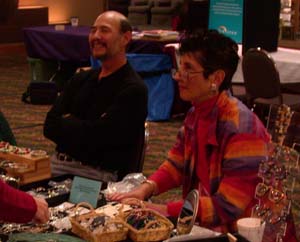 Rocky Mountain TESOLers are a little different from the
rest of us. There is a peacefulness in their eyes. They
live near some of the most beautiful landscapes in the
world. Some of the session titles convey a sense of the
uniquely "New Age" flavor of TESOL practiced out here in
the west: "Teaching Freire in Workplace ESL Settings," by
Kate Goodspeed (Emily Griffith Opportunity School); "Socio Theory, Systemic Change and Teacher
Preparation," by Honorine Nocon and Mark Clarke (both of the University of
Colorado-Denver); "Synthesizing
Individual Difference Research," by Ann Conway (Peace Corps), Martha Denney (Colorado State University),
Eileen Mattingly (Coverdell World Wise Schools) and Patricia McGuire (Western New Mexico University); "Consciousness-Raising
Strategy and Grammar Development," by Rama Munajat (Ball State University); "Stumbling
A Mile in Our Students' Shoes," by Maggie Pike (South Middle School-Aurora), Patty Coleman (South Middle School-Aurora),
Sherry Keck (Middle School Teacher) and Mary Madera (Douglas County High School).
Rocky Mountain TESOLers are a little different from the
rest of us. There is a peacefulness in their eyes. They
live near some of the most beautiful landscapes in the
world. Some of the session titles convey a sense of the
uniquely "New Age" flavor of TESOL practiced out here in
the west: "Teaching Freire in Workplace ESL Settings," by
Kate Goodspeed (Emily Griffith Opportunity School); "Socio Theory, Systemic Change and Teacher
Preparation," by Honorine Nocon and Mark Clarke (both of the University of
Colorado-Denver); "Synthesizing
Individual Difference Research," by Ann Conway (Peace Corps), Martha Denney (Colorado State University),
Eileen Mattingly (Coverdell World Wise Schools) and Patricia McGuire (Western New Mexico University); "Consciousness-Raising
Strategy and Grammar Development," by Rama Munajat (Ball State University); "Stumbling
A Mile in Our Students' Shoes," by Maggie Pike (South Middle School-Aurora), Patty Coleman (South Middle School-Aurora),
Sherry Keck (Middle School Teacher) and Mary Madera (Douglas County High School).
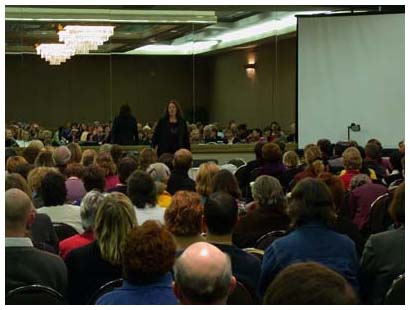
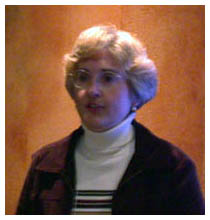 Another area in which Peggy Hull's Spanish-learning experience
has informed her English-teaching practices regards composition
skills. "What helps me write in L2?," she reflected. "Knowing
how to write in my language; making use of teacher comments and
corrections to formulate rules; teacher paraphrasing of awkward
passages; Microsoft Word's 'Insert Comment'; and immediate
feedback." Corrections, she warned, can be a waste of time
if students don't find them meaningful. Ms. Hull gave as an
example the practice one of her long-ago Spanish teachers had
of completely rewriting her journal entries in perfect Spanish
and never giving her back the original drafts.
Another area in which Peggy Hull's Spanish-learning experience
has informed her English-teaching practices regards composition
skills. "What helps me write in L2?," she reflected. "Knowing
how to write in my language; making use of teacher comments and
corrections to formulate rules; teacher paraphrasing of awkward
passages; Microsoft Word's 'Insert Comment'; and immediate
feedback." Corrections, she warned, can be a waste of time
if students don't find them meaningful. Ms. Hull gave as an
example the practice one of her long-ago Spanish teachers had
of completely rewriting her journal entries in perfect Spanish
and never giving her back the original drafts.
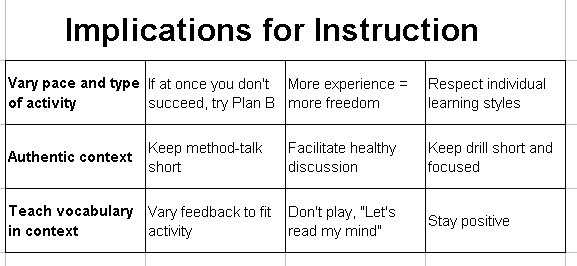
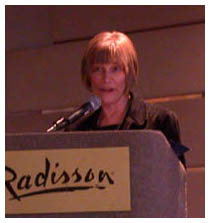 The Gladys Doty Award is for research,
publication, professional presentations, leadership, public
service and assuming an active role in educational advocacy,
explained Ms. Sihombing. "Nancy Storer is a wonderful choice
for this year's award because of her numerous and varied
leadership contributions both at state and national levels."
The Gladys Doty Award is for research,
publication, professional presentations, leadership, public
service and assuming an active role in educational advocacy,
explained Ms. Sihombing. "Nancy Storer is a wonderful choice
for this year's award because of her numerous and varied
leadership contributions both at state and national levels."
 The long drive to Denver from Hays, Kansas, to participate
in the Rocky Mountain TESOL Convention was worthwhile in
many ways. After Carolyn Graham's session, I found myself
forming jazz chants in my head while engaging in conversations
with other conference-goers. After Peggy Hull's talk, I
was motivated to start looking for a language learning
challenge beyond my lifelong experience with Spanish: what
is it like to start learning a brand new language? That's
the question we have to come to grips with if we are going
to be empathetic, effective ESL teachers. I enjoyed great
conversational exchanges with teachers from Garden City,
Denver and many, many other places. I saw Jayne Leshinsky, whom I had
studied with at Kansas University, where both of us completed
Masters degrees in TESL years ago. She has spent the past
two decades achieving success as a teacher, administrator
and author (Authentic Listening And Discussion For Advanced Students, Pearson
Learning Group, 1995). I met other Kansans who had relocated
to Colorado, including Paige Progar-Jaumann, now Coordinator
of the Global Business Communication Program, Division of
Continuing Education, in the International English Center
at University of Colorado at Boulder.
The long drive to Denver from Hays, Kansas, to participate
in the Rocky Mountain TESOL Convention was worthwhile in
many ways. After Carolyn Graham's session, I found myself
forming jazz chants in my head while engaging in conversations
with other conference-goers. After Peggy Hull's talk, I
was motivated to start looking for a language learning
challenge beyond my lifelong experience with Spanish: what
is it like to start learning a brand new language? That's
the question we have to come to grips with if we are going
to be empathetic, effective ESL teachers. I enjoyed great
conversational exchanges with teachers from Garden City,
Denver and many, many other places. I saw Jayne Leshinsky, whom I had
studied with at Kansas University, where both of us completed
Masters degrees in TESL years ago. She has spent the past
two decades achieving success as a teacher, administrator
and author (Authentic Listening And Discussion For Advanced Students, Pearson
Learning Group, 1995). I met other Kansans who had relocated
to Colorado, including Paige Progar-Jaumann, now Coordinator
of the Global Business Communication Program, Division of
Continuing Education, in the International English Center
at University of Colorado at Boulder.
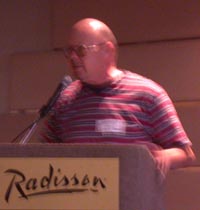 I shared ideas with about 40 teachers
in a session on early interventions that I led, and came away
very charged up and ready to go.
I shared ideas with about 40 teachers
in a session on early interventions that I led, and came away
very charged up and ready to go.
Larry Fisher, Executive Secretary of CoTESOL, and this year's Convention Chair Linda Kowal, Program Chair Alan Miller and President Bruce Rogers, really know how to put together a great learning conference. My hat's off to them.
Report by Robb Scott, Hays, KANSAS
Robb@ESLminiconf.net
2003 ESL MiniConference Online